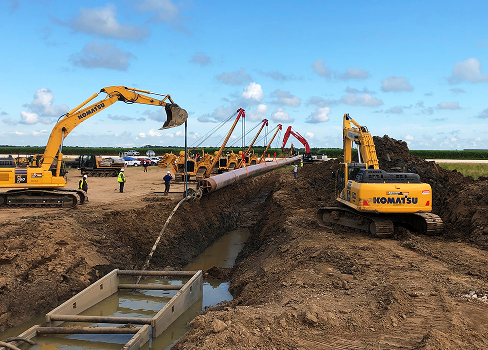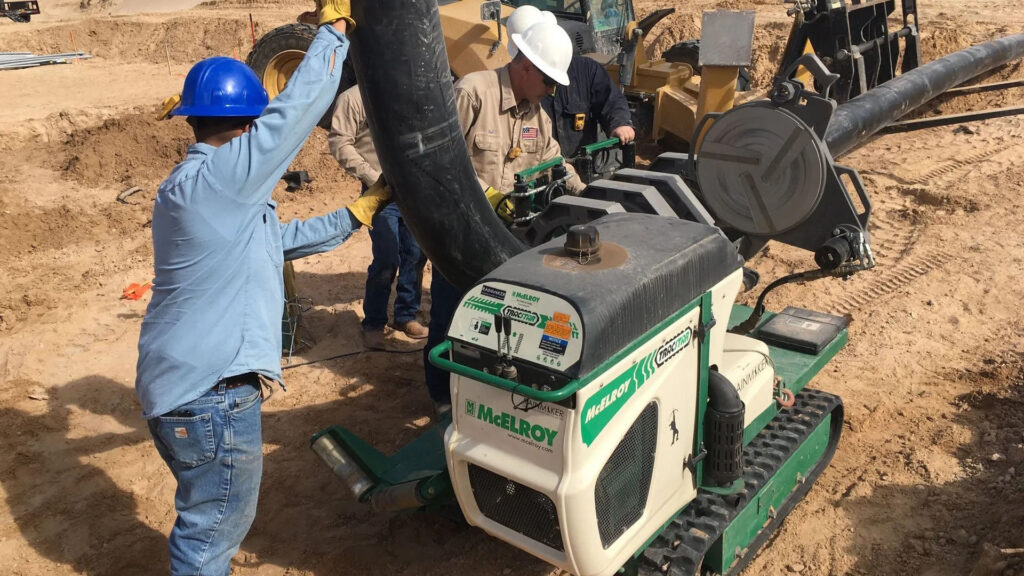How Safety Standards Shape Reliable Pipeline Construction Services
Wiki Article
The Necessary Overview to Comprehending Pipeline Construction Providers and Their Relevance
Pipeline Construction solutions are basic to the transport of necessary resources such as water, gas, and oil. These solutions include thorough preparation and execution, adhering to rigorous security and environmental standards. As the market adapts to contemporary obstacles, comprehending its implications and components becomes significantly vital. What elements contribute to the expanding value of these solutions in today's economy? The following areas will certainly discover these essential facets.Review of Pipeline Construction Providers
Pipeline Construction solutions encompass a series of tasks necessary for the setup and maintenance of pipelines utilized to move numerous compounds, including oil, water, and gas. These services are crucial for ensuring the efficient and secure movement of sources from one location to one more. The process normally begins with thorough preparation and design, which takes right into account regulatory requirements, ecological factors to consider, and logistical challenges.Once preparation is full, excavation and grading of the land are conducted to prepare the site for Pipeline installation. This is adhered to by the actual laying of the pipelines, which includes welding or joining areas with each other to produce a continuous flow course. After setup, rigorous screening is performed to assure stability and safety and security. Upkeep solutions are likewise provided to deal with any issues that may occur with time. On the whole, Pipeline Construction services play an essential role in supporting infrastructure for power and water distribution.
Secret Parts of Pipeline Construction
An effective Pipeline Construction project counts on several key components that ensure the secure and effective installation of the Pipeline system. Initially, comprehensive site assessments are critical, as they recognize the geographical and environmental aspects that might influence Construction. Next off, the choice of suitable products, such as pipelines and installations, is vital for securing sturdiness and compatibility with the moved substances.Progressed Construction techniques, consisting of trenchless innovation and directional boring, improve performance and minimize environmental effect. Effective project monitoring is an additional essential element, collaborating labor, devices, and timelines to fulfill project objectives.
Additionally, communication amongst stakeholders, consisting of engineers, service providers, and neighborhood authorities, warranties alignment on project specs and requirements. Thorough high quality control procedures throughout the Construction process ensure conformity with sector requirements and make best use of the Pipeline's functional lifespan. Collectively, these parts develop the foundation of an effective Pipeline Construction job.
Safety Specifications and Laws in Pipeline Construction

Regulative bodies, such as the Occupational Safety And Security and Health Management (OSHA) and the Pipeline and Hazardous Products Safety And Security Management (PHMSA), stated particular needs that regulate Construction techniques. These include procedures for equipment usage, worker training, and emergency feedback procedures. By carrying out these standards, Construction companies not just shield their workers but likewise safe public trust. Ultimately, extensive safety and security steps add to the lasting success of Pipeline projects, ensuring they fulfill both operational and environmental expectations.
Environmental Factors To Consider in Pipeline Projects

Ecological considerations are important to the preparation and implementation of Pipeline jobs. These jobs should assess prospective effect on ecosystems, water sources, and regional wildlife. Conducting extensive ecological influence assessments (EIAs) is important, permitting stakeholders to identify and reduce risks before Construction starts.
Securing delicate areas, such as habitats and wetlands, typically requires carrying out details style functions or alternate routing to minimize disturbance. Furthermore, Pipeline operators are entrusted with establishing techniques for protecting against spills and leakages, which can have disastrous effects on the environment.
Involvement with neighborhood neighborhoods is important, as public problems can cause task alterations that improve environmental management. Conformity with guidelines set by environmental firms assures that jobs satisfy sustainability requirements, cultivating an equilibrium between framework demands and eco-friendly conservation. Inevitably, addressing ecological considerations not only safeguards nature however likewise advertises area depend on and project viability.
The Function of Innovation in Pipeline Construction
Technology plays an i was reading this important role in modern-day Pipeline Construction, improving performance and accuracy. Advanced surveying techniques permit specific planning and implementation, lessening ecological influence and task hold-ups. Furthermore, the combination of automation and robotics improves procedures, lowering labor expenses and boosting security on Construction websites.Advanced Checking Methods
Advanced evaluating strategies play an important function in the successful execution of Pipeline Construction jobs. These techniques leverage advanced technology to ensure precise mapping and analysis of the surface where pipes will be mounted. Techniques such as Geographic Info Equipment (GIS), LiDAR (Light Detection and Ranging), and 3D modeling enable designers to analyze the landscape and envision, determining potential barriers and environmental concerns. By using these advanced devices, groups can boost precision ready and alignment, considerably reducing the danger of errors during Construction. In addition, real-time data collection permits immediate modifications and notified decision-making throughout the task lifecycle. Eventually, these surveying advancements add to boosted efficiency, security, and sustainability in Pipeline Construction efforts.Automation and Robotics

Economic Impact of Pipeline Framework
Pipeline facilities plays a necessary function in assisting in and shaping regional economic situations profession. By providing a dependable means of transferring oil, gas, and various other products, pipelines reduce transportation expenses and enhance supply chain effectiveness. This infrastructure attracts investment, promotes task creation, and cultivates financial development in surrounding areas.Furthermore, the Construction and maintenance of pipelines contribute substantially to neighborhood economies, developing various employment chances in different markets, from design to labor. The increase of jobs often results in raised spending in regional companies, additionally bolstering economic activity.
Furthermore, pipes boost energy security by making certain a steady supply of resources, which is important for property needs and industrial procedures. As areas become adjoined with Pipeline networks, they get to more comprehensive markets, boosting competitiveness and financial durability. As a result, the financial effect of Pipeline infrastructure is multifaceted, influencing both immediate regional economic climates and more comprehensive regional advancement.
Future Fads in Pipeline Construction Providers
The future of Pipeline Construction solutions is progressing in reaction to technological advancements, regulatory adjustments, and expanding environmental considerations. Advancements such as drones and robotics are improving assessment and upkeep procedures, enhancing safety and security and performance. Automation is positioned to reduce labor costs and enhance precision in Construction procedures. Additionally, the enhancing emphasis check this on sustainability is prompting firms to adopt eco-friendly content materials and practices, aligning with global initiatives to reduce carbon footprints.Governing structures are additionally adapting to resolve environmental effects, pressing for greater openness and liability in Pipeline tasks. Moreover, the combination of clever technologies, consisting of real-time tracking systems, is anticipated to enhance the dependability and efficiency of Pipeline networks. As energy demands shift toward renewable resources, Pipeline Construction services will likely see a surge in projects associated with biofuels and hydrogen transport. Generally, these patterns indicate a transformative duration for the Pipeline Construction sector, concentrated on development and sustainability.
Often Asked Inquiries
What Kinds of Pipelines Are Frequently Created?
Numerous kinds of pipes are commonly built, including oil, water, gas, and sewer pipelines - Pipeline Construction Services. Each serves unique functions, facilitating the transport of crucial resources across areas while sticking to safety and ecological lawsHow much time Does a Typical Pipeline Task Take?
The period of a typical Pipeline task varies considerably, typically varying from numerous months to a couple of years. Elements affecting this timeline include task complexity, regulative authorizations, and ecological factors to consider that have to be attended to.Who Regulates Pipeline Construction Firms?
Pipeline Construction business are managed by various federal, state, and local firms, consisting of the Pipeline and Hazardous Materials Security Administration (PHMSA) and state public utility compensations, guaranteeing compliance with security and environmental criteria throughout the Construction process.What Are Usual Products Utilized in Pipeline Construction?
Common products utilized in Pipeline Construction consist of polyethylene, pvc, and steel. Each material offers unique advantages such as resistance, adaptability, and toughness to deterioration, making them appropriate for different applications in transporting liquids and gases.
How Are Pipeline Construction Expenses Approximated?
Pipeline Construction expenses are estimated by examining factors such as product expenses, labor rates, task complexity, ecological considerations, and regulative requirements (Pipeline Construction Services). Exact price estimate warranties efficient budgeting and project preparation throughout the Construction processPipeline Construction solutions incorporate a variety of activities crucial for the installation and upkeep of pipelines utilized to transfer various substances, consisting of oil, gas, and water. A successful Pipeline Construction job relies on numerous key components that guarantee the effective and safe installment of the Pipeline system. Advanced evaluating strategies play a vital role in the successful execution of Pipeline Construction jobs. Various kinds of pipes are generally constructed, consisting of oil, water, gas, and sewer pipes. Pipeline Construction expenses are estimated by examining elements such as material expenses, labor rates, task complexity, environmental factors to consider, and governing demands.
Report this wiki page